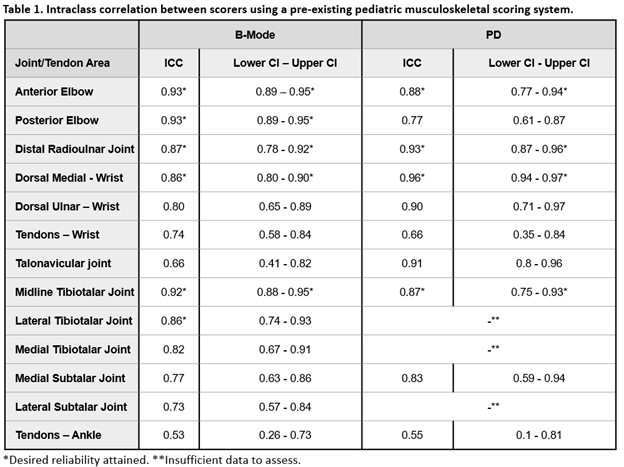Session Information
Session Type: Poster Session C
Session Time: 8:30AM-10:30AM
Background/Purpose: Localized musculoskeletal ultrasound (MSUS) examination is used in adult rheumatology clinics and has been shown to be a valid and feasible method for assessing joint inflammation in rheumatoid arthritis. Pediatric MSUS continues to be an evolving topic of research within the field, with ongoing standardization of protocol and scoring systems. The purpose of this study is to determine the time and resources necessary to reliably train pediatric MSUS sonographers of differing specialties and levels of expertise to reliably utilize a recently proposed 12-joint MSUS scoring protocol in children.
Methods: Physicians of varying degrees of MSUS experience were recruited, including a second-year pediatric rheumatology fellow, a third-year pediatric rheumatology fellow, a pediatric rheumatologist, a pediatric radiology fellow, and a pediatric radiology attending with expertise in musculoskeletal imaging. The group then underwent educational and calibration exercises led by a pediatric rheumatology attending with expertise in musculoskeletal ultrasound, detailing the normal anatomy and pathologic variations related to arthritis of the elbow, metacarpal-phalangeal joint, wrist, knee, and ankle in B-mode and power doppler (PD) – mode. The scoring system is based on a semiquantitative scale with grading from 0-3 (0 being normal, 3 being severe pathology), utilizing both B- and PD-mode images. Each participant then scored ultrasound images from an image bank including B- and PD-mode of each joint of varying pathology. The inter-rater reliability, using the intraclass correlation (ICC), was assessed, with a goal of 0.75 or higher for the lower CI for each joint.
Results: A 26- to 39-minute educational and calibration exercise was performed for each selected joint. Participants then completed a reliability exercise for each joint (Table 1). There was good to excellent interrater reliability for the anterior elbow B-mode and PD-mode, posterior elbow B-mode, distal radioulnar joint B-mode and PD-mode, dorsal medial view of the wrist B-mode and PD-mode, talonavicular joint PD-mode, and midline tibiotalar joint B-mode and PD-mode. The remainder of the joint and tendon views demonstrated need for improvement, when considering the goal of 0.75 or higher for the lower CI. At the time of submission, the results for the knee scoring are pending, and there are ongoing training activities looking to improve the reliability of this diverse group. Repeat calibration and scoring exercises will continue to occur until excellent reliability is reached for all views/joints in this group.
Conclusion: Undergoing a single round of educational and calibration sessions facilitated the upskill of a diverse group of academic pediatric ultrasonographers, who demonstrated good to excellent interrater reliability for some joints using a recently proposed pediatric 12-joint MSUS scoring system. There is need for continued improvement in reproducibility and interrater reliability, perhaps via repeated interactive educational and calibration exercises.
To cite this abstract in AMA style:
Esteban Y, Rodriguez-Smith J, Tominna M, Meyers A, Henrickson M, Cassedy A, Ting T, Vega-Fernandez P. Teaching and Reproducibility of a Pediatric Musculoskeletal Ultrasound Scoring System [abstract]. Arthritis Rheumatol. 2021; 73 (suppl 9). https://acrabstracts.org/abstract/teaching-and-reproducibility-of-a-pediatric-musculoskeletal-ultrasound-scoring-system/. Accessed .« Back to ACR Convergence 2021
ACR Meeting Abstracts - https://acrabstracts.org/abstract/teaching-and-reproducibility-of-a-pediatric-musculoskeletal-ultrasound-scoring-system/

